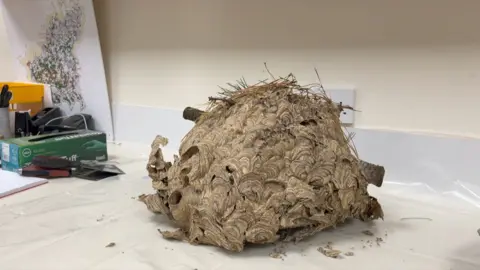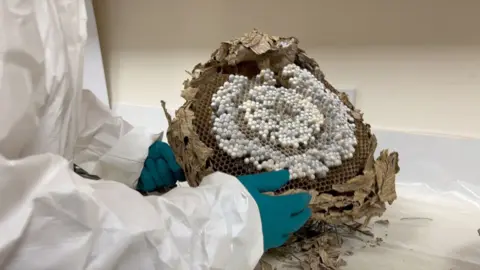Asian hornet nests dissected to monitor species
The dissection of Asian hornet nests is being carried out to inform the strategy used to manage the invasive species in Guernsey.
The species, which feeds on honeybees and other pollinators, was first seen in the island in 2017 and there have been regular sightings ever since as new colonies are established by queens coming from France.
Guernsey Asian hornet team said the last nest treated and captured by the team was found off Bulwer Avenue in September 2024.
Damien Harris, who showed the BBC the dissection of one nest, said it was caught before it had released its queens, so the strategy of monitoring and control would continue.
He said: "This nest when it was in its full size was 40 centimetres [16in] across - that would put it as sort of a medium.
"But, because we took it down in September, this would have had time to become a large nest later on as it still had two to three months of growing to do."
Mr Harris, who works for the States' Countryside and Land Management Services, said staff had found 15 queen hornets and three nests in Guernsey last year.
He added that the number of hornets found this year was drastically down on 2023.


"We had a real spike [in 2024], like everywhere else where we were up in the 50 mark," said Mr Harris. "And then we're back down [on 2023] to what is sort of normal since the invasion started with Asian hornet."
On removing nests, he said: "They're taken down usually the same day we treat them and they go straight into the freezer and they stay in that freezer... until we dissect them.
"We found out from 2023 that, even if we had a really sort of bad year, as we did that year, with lots of queens coming across from France, we carried on the strategy exactly the same in 2024 and we've got our numbers back down to manageable numbers.
"Having this nest treated, we didn't receive any further sighting of hornets in Guernsey, so we're pretty confident that there were no other nests on the island.
"With the leaves now being off the trees, we've had no sightings of any other potential nests being out there, so we're pretty confident we've got everything down."
Sightings of Asian hornets can be reported to the team.
Follow BBC Guernsey on X and Facebook. Send your story ideas to [email protected].
